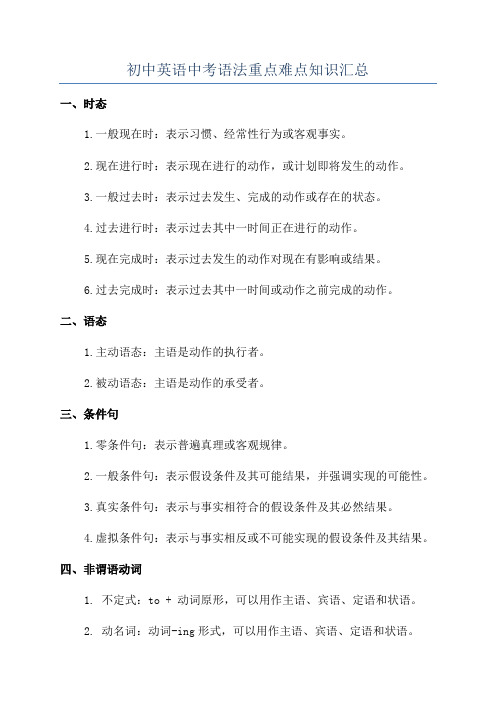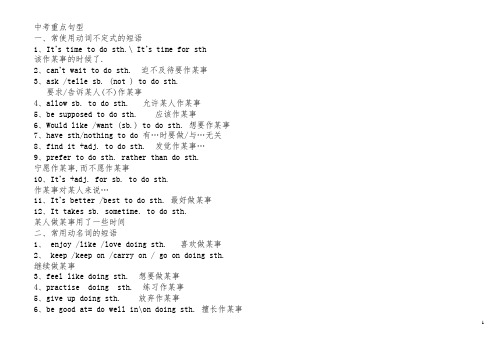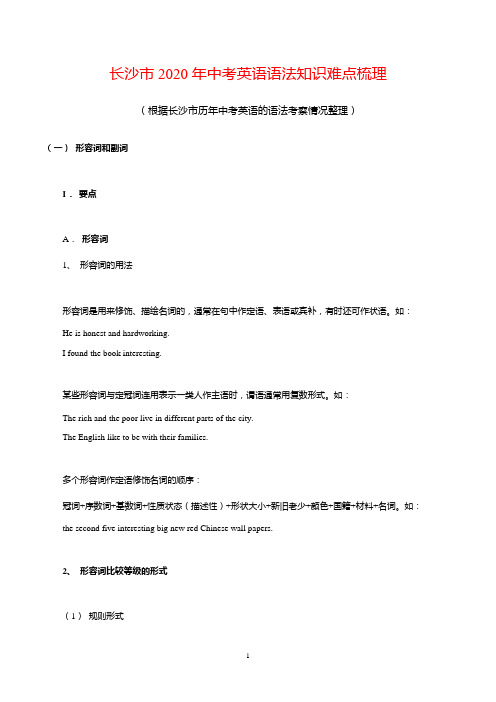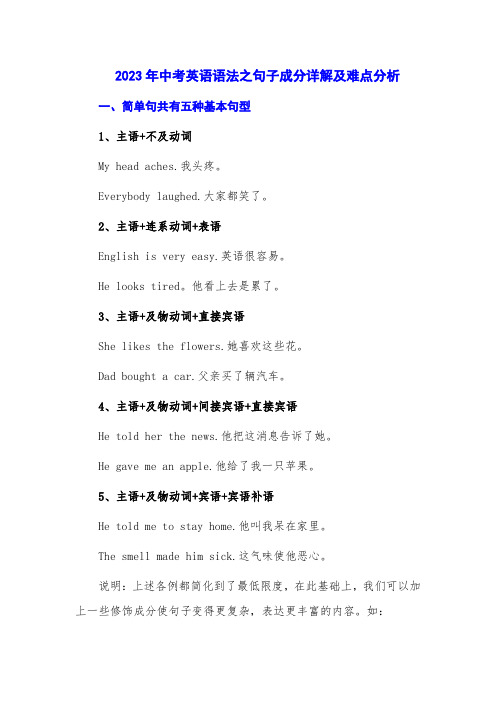中考英语语法难点大全
中考英语必考语法

中考英语必考语法一.英语语法重点与难点1、as…as…结构:你和汤姆是一样好的孩子。
You’re a boy as good as Tom.=You’re as good a boy as Tom.2、前者为简单句,主语只有一个,而后者为复合句,主语有两个,试比较:(1)too…to与so…that sb. can’t…的句型转换:The man was too angry to be able to speak. The man was so angry that he wasn’t able to speak.(2) too…to…与 not enough to句型的转换:He is too young to get married.=He is not old enough to get married.The book is too difficult for me to read.= The book is not easy enough for me to read.3、形容词原级表示比较级含义:约翰不象迈克那么苯。
John is not so stupid as Mike.John is less stupid than Mike.John is cleverer than Mike.4、用比较级表示最高级:约翰是班里最高的男生。
John is taller than any other boy in the class.John is the tallest boy in the class.5、the more….. the more….表示“越……越……”:The more books you read, the wider your knowledge is.The more food you eat, the fatter you are.6、more and more….表示“越来……越……”:More and more students realized the importance of a foreign language. Our country is getting stronger and stronger.二.中考考点—词组1. after, in 这两个介词都可以表示“……(时间)以后”的意思✓after 以过去为起点,表示过去一段时间之后,常用于过去时态的句子中? 如:She went after three days. 她是三天以后走的✓in 以现在为起点,表将来一段时间以后,常用于将来时态的句子中如:She will go in three days. 她三天以后要走2. how long, how often, how soon✓how long指多长时间,主要用来对一段时间(如three days, four weeks 等)提问。
初中英语中考语法重点难点知识汇总

初中英语中考语法重点难点知识汇总一、时态1.一般现在时:表示习惯、经常性行为或客观事实。
2.现在进行时:表示现在进行的动作,或计划即将发生的动作。
3.一般过去时:表示过去发生、完成的动作或存在的状态。
4.过去进行时:表示过去其中一时间正在进行的动作。
5.现在完成时:表示过去发生的动作对现在有影响或结果。
6.过去完成时:表示过去其中一时间或动作之前完成的动作。
二、语态1.主动语态:主语是动作的执行者。
2.被动语态:主语是动作的承受者。
三、条件句1.零条件句:表示普遍真理或客观规律。
2.一般条件句:表示假设条件及其可能结果,并强调实现的可能性。
3.真实条件句:表示与事实相符合的假设条件及其必然结果。
4.虚拟条件句:表示与事实相反或不可能实现的假设条件及其结果。
四、非谓语动词1. 不定式:to + 动词原形,可以用作主语、宾语、定语和状语。
2. 动名词:动词-ing形式,可以用作主语、宾语、定语和状语。
3. 现在分词:动词-ing形式,可作定语、表语等。
4. 过去分词:-ed或不规则变化形式,常用作被动语态和完成时。
五、情态动词1. can/could:表示能力、许可、可能等。
2. may/might:表示允许、请求、可能、推测等。
3. must:表示推测、肯定、必需等。
4. should:表示义务、建议、推测、必要等。
六、名词1.可数名词与不可数名词及其用法。
2.名词所有格的表示方法。
七、代词1.人称代词:主格、宾格、物主代词、反身代词等。
2. 指示代词:this, that, these, those等。
3. 不定代词:some, any, no, every, all, both等。
八、形容词与副词1.形容词的比较级和最高级形式及其用法。
2.副词的比较级和最高级形式及其用法。
九、连词1. 并列连词:and, or, but等。
2. 从属连词:because, when, if, although等。
初一至初三英语语法及中考难点

中考重点句型一、常使用动词不定式的短语1、It’s time to do sth.\ It’s time for sth该作某事的时候了.2、can’t wait to do sth. 迫不及待要作某事3、ask /telle sb. (not ) to do sth.要求/告诉某人(不)作某事4、allow sb. to do sth. 允许某人作某事5、be supposed to do sth. 应该作某事6、Would like /want (sb.) to do sth. 想要作某事7、have sth/nothing to do 有…时要做/与…无关8、find it +adj. to do sth. 发觉作某事…9、prefer to do sth. rather than do sth.宁愿作某事,而不愿作某事10、It’s +adj. for sb. to do sth.作某事对某人来说…11、It’s better /best to do sth. 最好做某事12、It takes sb. sometime. to do sth.某人做某事用了一些时间二、常用动名词的短语1、 enjoy /like /love doing sth. 喜欢做某事2、 keep /keep on /carry on / go on doing sth. 继续做某事3、feel like doing sth. 想要做某事4、practise doing sth. 练习作某事5、give up doing sth. 放弃作某事6、be good at= do well in\on doing sth. 擅长作某事7、pay attention to doing sth. 注意作某事8、what about/ how about doing sth.….怎么样(好吗)?9、Thank you for doing sth. 为…感谢某人10、mind doing sth. 介意作某事11、be used for doing sth./ be used to do sth. 、被用来作某事12、spend …(in) doing sth. 花时间作某时13、be busy doing/ with sth. 忙于作某事14、finish doing sth. 作完某时15、look forward to doing. 盼望做某事16、prefer doing sth. to doing sth. 喜欢…胜过…17、be/get used to doing sth. 习惯作某事18、keep / stop/ prevent sb. from doing sth.阻止某人作某事三、省略动词不定式的短语1、一看二听三使役see/ hear/ feel/ notice/ look at /listen to sb. do sth. 看见/听见/感觉/注意某人作某事make /let /have sb. do sth. 使/让某人做某事2、help sb. (to) do sth/ with sth.帮助某人作某事3、 had better (not) do sth. 最好(不)做某事4、 Why don’t you/ not do sth.为什么不作某事5、Would /Will / Could you please (not) do sth.请你(不)作某事好吗?四、同义词比较1、 stop to do sth. 停下正在做的事去作另一件事stop doing sth. 停止正在作的事eg. When the teacher came into the classroom, the students stopped talking. After he worked for an hour, he stopped to have a rest.2、 forget / remember to do sth.忘记/记得要去作某事forget / remember doing sth.忘记记得曾经做过某事eg. Please remember to bring my book to school.I remember doing my homework3、 used to do sth. 过去常常作某事be used to do sth. 被用来作某事be used to doing sth. 习惯于作某事eg. My father used to smoke.Wood is used to make paper.I am used to getting up early.4、So +be/助动词/情态动词 + 主语…也一样So +主语+be/助动词/ 情态动词是呀,表示赞同别人的观点Neither + be /助动词/ 情态动词+主语…也不一样(用于否定句)eg. He has been to Beijing. So have I.It’s a fine day. So it is.She doesn’t like eggs. Neither do I.5、 too…to do sth. 太…而不能…so +adj. /adv + that(从句) 如此…以致…such +(a/an +adj.)+n.+ that(从句)如此…以致…(not) enough (for sb.) to do sth.(对某人来说)做某事(不)够eg. The boy is too young to go to school.The boy is so young that he can’t go to school.He is such a young boy that he can’t go to school.The boy is not old enough to go to school.五、常考知识点1、keep +adj. 保持…状态keep (sb.) doing sth.继续做某事/使某人老是做某事eg. Everyone should keep our classroom clean.It’s too late, but he still keeps working.Lily always keeps us waiting for her.2、make+ sb. + n. 使某人成为make + sb. + adj. 使某人…make sb. do sth. 使某人做某事Sb. be made to sth. 某人被迫做某事eg. We made Peter our monitor.Books make us happy.He often makes me laugh.The workers were made to work 12 hours a day.3、I don’t think that 我认为…不eg. I don’t think you are right.4、It’s /was/has been+ some time +since+一般过去时…自从…以来有多久了eg. It has been two years since we met last time.6、 What do you mean by?=What does .. mean?=what is the meaning of...?是什么意思?eg. What do you mean by “computer”?=What does “computer” mean?=what is the meaning of "computer"?7、 What do you think of…/How do you like …?你认为…怎么样?eg. What do you think of this film /How do you like this film?8、 What is/was/will …be like? ..怎么样?eg. What is the weather like?What will the life in the future be like?9、 It’s said/ reported that…据说/据报道It's well known that 众所周知It's thought that 大家认为eg. It’s said that the population of the word would be 6 billion in 2050.10、one of the +形容词最高级+名词复数…其中之一eg. Shanghai is one of the biggest cities in China.11、neither…nor…既不…也不(两者都不)either…or…要么…要么/或者…或者/不是…就是not only…but also…不但…而且以上三个词做主语时,要用就近原则eg. Neither you nor he has been to the USA.Either he or you go to the park.Not only my mother but also my father is a teacher.neither of 两者都不either of 两者选一none of 没有一个以上三个做主语时,谓语动词用单数All of 全部 Both of 两者都以上二个做主语时,谓语动词用复数12、比较级+ than +any other +名词单数…比其余任何一个…比较级+ than + the other+名词复数eg. Shanghai is bigger than any other city=shanghai is bigger than the other cities in China.13、When(当…的时候), if (如果), as soon as(一…就), until(直到…才), unless(除非/如果…不)这几个词引导的时间或条件状语从句时,主句要用一般将来时.从句一般现在时eg. I will call you when he comes.If it doesn’t rain tomorrow, we will have a picnic.As soon as I get to Beijing, I’ll come to see you.He won’t go to bed until his parents come back.Unless you work hard, you won’t catch up with others.希望我的答案对你有帮助初一的语法知识包括:主要掌握几种时态1,一般现在时2,一般过去时3,一般将来时4,现在进行时还有几种词1,名词2,代词3,形容词4,动词5,冠词初一英语语法一、词法1、名词A)、名词的数我们知道名词可以分为可数名词和不可数名词,而不可数名词它没有复数形式,但可数名词却有单数和复数之分,复数的构成如下:一)在后面加s。
长沙市2020年中考英语语法知识难点梳理

长沙市2020年中考英语语法知识难点梳理(根据长沙市历年中考英语的语法考察情况整理)(一)形容词和副词I.要点A.形容词1、形容词的用法形容词是用来修饰、描绘名词的,通常在句中作定语、表语或宾补,有时还可作状语。
如:He is honest and hardworking.I found the book interesting.某些形容词与定冠词连用表示一类人作主语时,谓语通常用复数形式。
如:The rich and the poor live in different parts of the city.The English like to be with their families.多个形容词作定语修饰名词的顺序:冠词+序数词+基数词+性质状态(描述性)+形状大小+新旧老少+颜色+国籍+材料+名词。
如:the second five interesting big new red Chinese wall papers.2、形容词比较等级的形式(1)规则形式一般说来,单音节词及少数双音节词在后加-er; --est 来构成比较级和最高级;其他双音节词及多音节词在前加more, most.如:great-greater-greatestbusy-busier-busiestimportant-more important-(the)most important(2)不规则形式good (well)-better-bestbad (ill)-worse-worstmany (much)-more-mostlittle-less-least(3)形容词比较等级的用法①表示两者的比较,用形容词的比较级+than. 如:He is cleverer than the other boys.This one is more beautiful than that one.②表示两者以上的比较,用"the +形容词最高级(+名词)+of(in) …"如:He is the cleverest boy in his class.③表示两者是同等程度,用"as +形容词原级+as". 如:He is as tall as I.I have as many books as you.④越… 越…例如:The more I learn, the happier I am.⑤ You can never be too careful. 越小心越好又如:You can never praise the teacher too highly.你怎么赞扬这个老师也不过分。
初中英语中考语法重点难点知识汇总

中考英语语法重点难点知识汇总一.英语语法重点与难点1、 as…as…结构:You’re a boy as good as Tom.=You’re as good a boy as Tom.你和汤姆是一样好的孩子。
2、 (1)too…to与 so…that sb. can’t…的句型转换:前者为简单句,主语只有一个,而后者为复合句,主语有两个,试比较:The man was too angry to be able to speak.The man was so angry that he wa sn’t able to speak.(2) too…to…与 not enough to句型的转换:He is too young to get married.=He is not old enough to get married.The book is too difficult for me to read.=The book is not easy enough for me to read.3、形容词原级表示比较级含义:约翰不象迈克那么苯。
John is not so stupid as Mike.John is less stupid than Mike.John is cleverer than Mike.4、用比较级表示最高级:约翰是班里最高的男生。
John is taller than any other boy in the class.John is the tallest boy in the class.5、 the more….. the more….表示“越……越……”:The more books you read, the wider your knowledge is.The more food you eat, the fatter you are.6、 more and more….表示“越来……越……”:More and more students realized the importance of a foreign language.Our country is getting stronger and stronger.二.中考考点—词组1. after, in 这两个介词都可以表示“……(时间)以后”的意思after 以过去为起点,表示过去一段时间之后,常用于过去时态的句子中如:She went after three days. 她是三天以后走的in 以现在为起点,表将来一段时间以后,常用于将来时态的句子中如:She will go in three days. 她三天以后要走2. how long, how often, how soonhow long指多长时间,主要用来对一段时间(如three days, four weeks 等)提问?如:How long ago was it? 这是多久前的事了?how often指每隔多久,主要用来对频率副词或状语(如once a week等)提问?如:—How often does he come here? —Once a month. 他(每隔)多久来一次?每月一次。
中考英语9大语法难点详解

中考英语9大语法难点详解宾语从句1. 宾语从句的含义充当主句宾语的从句叫做宾语从句。
如:She knew that the teacher had seen the film.她知道这位老师看过这部电影。
“that the teacher had seen the film”做knew 的宾语,同时又是由连接词that 引导的从句,所以它叫做宾语从句。
2. 宾语从句的分类(1)动词宾语从句:顾名思义,它是位于动词后面的宾语从句。
如:He asked whose handwriting was the best in our class.他问我们班上谁的书法最好。
(2)介词宾语从句:顾名思义,它是位于介词后面的宾语从句。
如:I agree with what you said just now.我同意你刚才说的话。
(3)形容词宾语从句:顾名思义,它是位于形容词后面的宾语从句。
如:I am afraid that I will be late. 恐怕我要迟到了。
3. 引导宾语从句的连接词(1)that:没有含义,在宾语从句中不做成分(2)whether/if:表示是否,在宾语从句中不做成分。
I don't know if /whether he still lives here after so many years. 我不知道这么多年后,他是否还住在这里。
(3)连接代词:what, which, who, whom, whose(在宾语从句中做主、宾、表和定语)连接副词:where, when, how, why(在宾语从句中做状语)The small children don't know what is in their stockings.(what 在宾语从句中做主语)这些小孩子不知道什么在他们的长筒袜里。
Could you tell me why you were late for the meeting this morning?(why 在宾语从句中做原因状语)你能告诉我为什么你今天早上开会迟到吗?4. 在做宾语从句的题目时应注意两点(1)时态:①当主句是现在时态时,宾语从句可以根据需要使用任何时态。
初中英语语法重难点梳理

初中英语语法重难点梳理英语语法作为学习英语的重要组成部分之一,在初中阶段的英语学习中占据着重要的地位。
掌握好英语语法可以帮助我们正确理解和表达英语,提高英语写作和口语能力。
本文将对初中英语语法的重难点进行梳理,帮助学生加深理解和应用。
1. 时态和语态时态和语态是英语语法中的基础知识,也是初中阶段的重点难点之一。
常见的时态有一般现在时、一般过去时、一般将来时等。
在运用时态时,需要注意动词的形式和辅助动词的使用。
语态包括主动语态和被动语态,主动语态强调动作的执行者,被动语态强调动作的承受者。
掌握时态和语态的正确用法,能够使句子的表达更加准确和丰富。
2. 分词分词是英语语法中的一个重要部分,分为现在分词和过去分词。
现在分词以-ing结尾,过去分词一般以-ed结尾。
分词可以用作形容词,修饰名词或代词,还可以构成分词短语作状语。
分词的正确运用有助于增强句子的表达能力和语言的丰富性。
3. 宾语从句宾语从句是一个复合句,用来作谓语动词的宾语。
宾语从句引导词包括连词that、if、whether等,用于连接宾语从句和主句。
掌握宾语从句的构成和运用可以使句子结构更加复杂,表达更加准确和流畅。
4. 名词性从句名词性从句可以充当句子中的名词成分,包括主语从句、宾语从句、表语从句和同位语从句。
名词性从句的构成和引导词不同,要根据具体的语境和句子结构来选择合适的从句类型。
熟练运用名词性从句可以使句子更加清晰和连贯。
5. 比较级和最高级比较级和最高级是表示程度、大小和数量的形式之一。
比较级用于两个人或事物之间的比较,最高级表示三个或三个以上人或事物之间的比较。
比较级的构成和比较级形容词的变化规则需要掌握,同时要注意比较级的用法,包括比较级与连词than的搭配以及比较级的句式结构。
6. 介词短语介词短语通常由介词和跟在后面的名词、代词构成,用来修饰其他的词或短语。
介词短语在句子中可以表示位置、时间、方式、原因等。
熟练掌握常用的介词和介词短语的用法,能够帮助我们准确表达自己的意思。
中考英语语法之句子成分详解及难点分析

2023年中考英语语法之句子成分详解及难点分析一、简单句共有五种基本句型1、主语+不及动词My head aches.我头疼。
Everybody laughed.大家都笑了。
2、主语+连系动词+表语English is very easy.英语很容易。
He looks tired。
他看上去是累了。
3、主语+及物动词+直接宾语She likes the flowers.她喜欢这些花。
Dad bought a car.父亲买了辆汽车。
4、主语+及物动词+间接宾语+直接宾语He told her the news.他把这消息告诉了她。
He gave me an apple.他给了我一只苹果。
5、主语+及物动词+宾语+宾语补语He told me to stay home.他叫我呆在家里。
The smell made him sick.这气味使他恶心。
说明:上述各例都简化到了最低限度,在此基础上,我们可以加上一些修饰成分使句子变得更复杂,表达更丰富的内容。
如:In fact, English is very easy to teach.事实上,英语很容易教。
She likes the flowers very much.她非常喜欢这些花。
He told her the news on the home.他把回家的路上这消息告诉了她。
二、哪些词在句中不担任句子成分一般说来,虚词在句中不能单独担任句子成分。
1、冠词:置于名词之前The boss and his secretary are flying to Paris.老板和他的秘书正飞往巴黎。
It was an greement the details of which could not be altered.这是一项其细节不可更改的协定。
Her birthday is next Monday, so I must buy hera present. 她的生日就在下星期一,所以我必须给她买一件礼物。
- 1、下载文档前请自行甄别文档内容的完整性,平台不提供额外的编辑、内容补充、找答案等附加服务。
- 2、"仅部分预览"的文档,不可在线预览部分如存在完整性等问题,可反馈申请退款(可完整预览的文档不适用该条件!)。
- 3、如文档侵犯您的权益,请联系客服反馈,我们会尽快为您处理(人工客服工作时间:9:00-18:30)。
介词I. 要点1、介词和种类(1) 简单介词,常用的有at, in, on, about, across, before, beside, for , to, without 等。
(2) 复合介词,如by means of, along with, because of, in front of, instead of等。
2、介词和其他词类的习惯搭配关系(1) 和动词的搭配,如agree with, ask for, belong to, break away from, care about等。
(2) 和形容词的搭配,如afraid of, angry with, different from, good at(3) 和名词的搭配,如answer to , key to, reason for, cause of, visit to等.3、介词短语可以有自己的修饰语,这种修饰语通常有right, just, badly, all, well, directly, completely等少数几个副词。
如:He came right after dinner.He lives directly opposite the school.4、某些介词的意义与用法举例(1) at, on, in(表时间)表示时间点用at,如at four o'clock, at midnight等;表示不确定的时间或短期假日也用at,如at that time, at Christmas等。
指某天用on, 如on Monday, on the end of November, 指某天的朝夕用on,如on Friday morning, on the afternoon of September lst等。
指长于或短于一天的时段用in,如in the afternoon, in February, in Summer, in 1999等。
(2) between, among(表位置)between仅用于二者之间,但说三者或三者以上中的每两个之间的相互关系时,也用between, 如I'm sitting between Tom and Alice.The village lies between three hills.among用于三者或三者以上之间。
如:He is the best among the students.(3) beside, besidesbeside意为"在…旁边",而besides意为"除…之外"。
如:He sat beside me.What do you want besides this?(4)in the tree, on the treein the tree 指动物或人在树上,而on the tree 指果实、树叶长在树上(5)on the way, in the way, by the way, in this wayon the way 指在路上in the way 指挡道by the way 指顺便问一句in this way 用这样的方法(6)in the corner, at the cornerin the corner 指在拐角内at the corner 指在拐角外(7)in the morning, on the morningin the morning 是一般说法on the morning 特指某一天的早晨(8)by bus, on the busby bus 是一般说法on the bus 特指乘某一辆车II. 例题例1 Do you know any other foreign language____ English?A exceptB butC besideD besides解析:A、B两项except等于but,意为"除了…",C-beside意为"在…旁边",不符合题意。
而D-besides, 意为"除了…之外,还有"。
所以该题正确答案为D。
该题意为:除了英语外,你还知道别的语言吗?例2 He suddenly returned ____ a rainy night.A onB atC inD during解析:我们均知道,at night这一短语,但如果night前有修饰词,表具体的夜晚,则要用介词on来修饰,故该题正确答案为A。
例3 I'm looking forward ____your letter.A toB inC atD on解析:该题正确答案为A。
look forward to 为固定搭配,意为"期望、盼望"。
连词I. 要点1、连词的种类(1) 并列连词用来连接并列关系的词、短语或分句,如and, for, or, both…and, either…or, neither…nor等。
(2) 从属连词用来引导从句,如that, if, whether, when, after, as soon as等。
除了从属连词(引导状语从句)外,还有其它可以用来引导从句的词类。
它们是连接代词和连接副词(引导名词性从句),关系代词和关系副词(引导定语从句)。
2、常用连词举例(1)and 和,并且They drank and sang all night.(2) both…and 和,既…也…Both my parents and I went there.(3) but 但是,而I'm sad, but he is happy.(4) either…or 或…或…,要么…要么…Either you're wrong, or I am.(5) for因为I asked him to stay, for I had something to tell him.(6) however 然而,可是Af first, he didn't want to go there. Later, however, he decided to go.(7) neither…nor 既不…也不Neither my parents nor my aunt agrees with you.(8) not only…but(also) 不但…而且…He not only sings well, but also dances well.(9) or 或者,否则Hurry up, or you'll be late.Are you a worker or a doctor?(10) so 因此,所以It's getting late, so I must go.(11) although 虽然Although it was late, they went on working.(12) as soon as 一…就I'll tell him as soon as I see him.(13) because 因为He didn't go to school, because he was ill.(14)unless 除非,如果不I won't go unless it is fine tomorrow.(15)until 直到…He didn't leave until eleven. (瞬间动词用于not… until 结构)He stayed there until eleven.(16)while 当…时候,而(表示对比)While I stayed there, I met a friend of mine. (while后不可用瞬间动词)My pen is red while his is blue.(17)for 因为He was ill, for he didn't come. (结论是推断出来的)(18)since自从…I have lived here since my uncle left.(19)hardly… when 一… 就I had hardly got to the station when the train left.(20)as far as 就… 来说As far as I know, that country is very small.You may walk as far as the lake. (一直走到湖那里)II. 例题例1 John plays football ____, if not better than, David.A as wellB as well asC so wellD so well as解析:该题意为:John踢足球如果不比David好的话,那也踢得和David 一样好。
和…一样好为as well as. 故该题正确答案为B.例2 She thought I was talking about her daughter, ____, in fact, I was talking about my daughter.A whenB whereC whichD while解析:该处意为"然而",只有while有此意思,故选D。
例3 Would you like a cup of coffee ____ shall we get down to business right away?A. andB. thenC. orD. otherwise解析:该处意为"或者",正确答案为C。
动词时态、语态I. 要点1、一般现在时(1) 表示经常发生的动作或现在存在的状态,常与sometimes, always, often, every day等时间状语连用。
如:Sometimes, we go swimming after school.(2) 表示客观真理、科学事实等。
如:The earth goes round the sun.2、现在进行时(1) 表示说话时或现阶段正在进行的动作,常与now, at present等时间状语连用。
如:What are you doing now?(2) 和always, continually等连用,表一种经常反复的动作,常含有某种情感。
如:He is always doing good deeds.3、现在完成时主要表示动作发生在过去,对现在仍有影响,或动作一直延续到现在,或可能还要继续下去,常与just, already, so far, once, never 等词连用。
